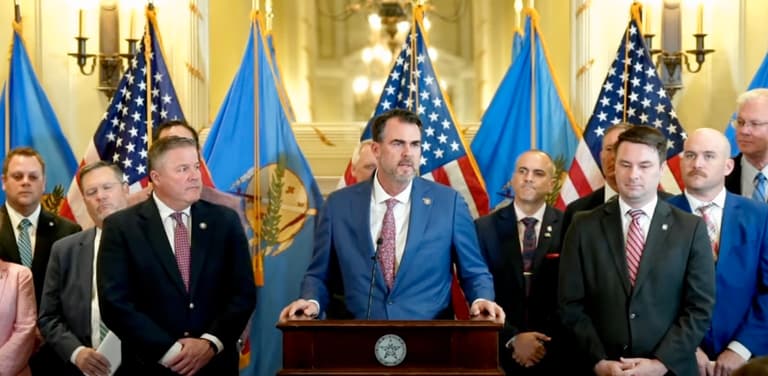
Budget & Tax
State leaders announce income-tax cut, path to repeal
Ray Carter | May 14, 2025
Oklahomans will pay less in income tax under a budget agreement announced by Gov. Kevin Stitt and legislative leaders, and lawmakers also committed to a plan that will continue gradually reducing the income tax until it is completely repealed.
“We’re signaling to the world and to the country that Oklahoma is open for business,” Stitt said.
Under the budget agreement, Oklahoma’s current top income-tax rate of 4.75 percent will be reduced to 4.5 percent starting in January 2026, and the agreement also eliminates three tax brackets that impact Oklahoma’s lowest-income individuals.
The agreement also provides for additional income-tax reductions as state revenue increases in future years, allowing for a gradual reduction in the state income tax until it is completely repealed over time.
Senate President Pro Tem Lonnie Paxton, R-Tuttle, said his longtime goal has been to create an environment in Oklahoma where “our kids and grandkids” will find “that the jobs are here for them if they want to stay here, that the good economic opportunities are here in Oklahoma, so they don’t need to go to Dallas, they don’t need to go to Kansas City to find a job; they’re all right here in Oklahoma.”
“This budget gets us a long way down the road to make sure that that happens,” Paxton said.
The governor noted that past income-tax reductions have encouraged greater investment and job creation in Oklahoma.
“We’re signaling to the world and to the country that Oklahoma is open for business.” —Gov. Kevin Stitt
“Oklahoma used to be at a 7 percent income-tax rate,” Stitt said. “And we’ve just, as we can, we’ve dropped it 40 basis points, a quarter here, 30 basis points here, a half. And so every time we’ve done that we’ve seen our economy expand. We’ve seen revenue continue to grow.”
However, Oklahoma’s current 4.75 percent personal income tax rate is among the highest in the region, meaning other states are now increasingly attractive to entrepreneurs.
Texas has no personal income tax while Colorado imposes a 4.4 percent rate. Officials in Arkansas have cut their rate to 3.9 percent. The top rate in Missouri fell to 4.7 percent in January. Louisiana has cut its income-tax rate to 3 percent.
Among bordering states, only Kansas and New Mexico currently have higher personal income-tax rates than Oklahoma—and Kansas officials recently voted to gradually cut their tax to 4 percent.
In addition, states across the nation have been lowering their income-tax rates with officials in Mississippi recently voting to eliminate their personal-income tax over time.
“We compete in a regional and then also a national market,” Stitt said, “and we have to stay up with our competition.”
The governor and lawmakers said this year’s budget agreement also includes lawsuit-reform provisions, such as a cap on vague “noneconomic damages” that often fuel “jackpot justice” awards and encourage frivolous litigation.
Under the agreement, lawsuits for actual damages will continue to have no cap on awards, meaning people could receive full recovery for lost wages, lifelong harm, and similar challenges.
Stitt said the lawsuit-reform measures will “protect our doctors, our small businesses, from frivolous lawsuits and out-of-control noneconomic damages (awards).”
The agreement also provides pay increases to veteran teachers, those with 26 to 40 years of experience. Under current state law, the minimum salary for teachers stays the same every year after they have taught for 25 years.
“It’s an incentive to stay in the classroom,” said House Speaker Kyle Hilbert, R-Bristow. “It’s also an incentive for teachers who have left the classroom to come back because they’ll get a major pay raise with this increase.”
Many state agency budgets will remain flat under the agreement, officials said.
The budget announcement drew swift opposition from legislative Democrats.
Senate Democratic Leader Julia Kirt of Oklahoma City dismissed the agreement as prioritizing “big companies and well-connected people.”

Ray Carter
Director, Center for Independent Journalism
Ray Carter is the director of OCPA’s Center for Independent Journalism. He has two decades of experience in journalism and communications. He previously served as senior Capitol reporter for The Journal Record, media director for the Oklahoma House of Representatives, and chief editorial writer at The Oklahoman. As a reporter for The Journal Record, Carter received 12 Carl Rogan Awards in four years—including awards for investigative reporting, general news reporting, feature writing, spot news reporting, business reporting, and sports reporting. While at The Oklahoman, he was the recipient of several awards, including first place in the editorial writing category of the Associated Press/Oklahoma News Executives Carl Rogan Memorial News Excellence Competition for an editorial on the history of racism in the Oklahoma legislature.